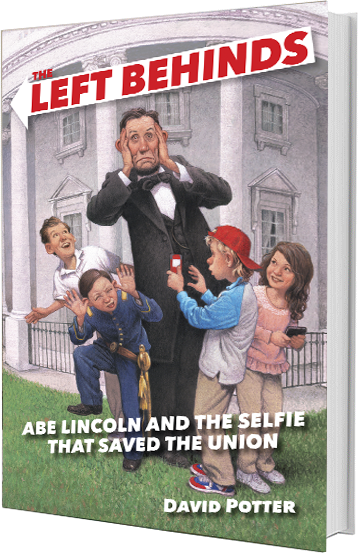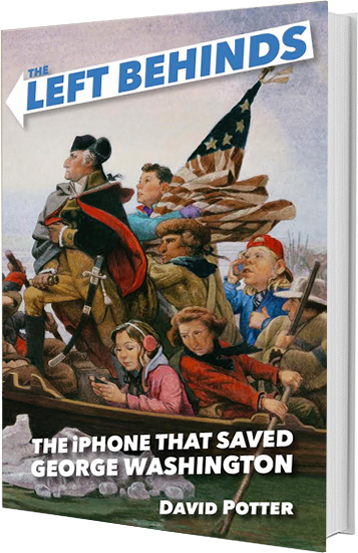Ever hear someone lament that things just aren’t what they used to be?
Well, here’s a news flash: they’re right. The world today is not the same as it was thirty years ago.
Not the world, not the country, not your neighborhood, and not you.
And that is a good thing.
I would go so far as to say it is the essential thing, so far as the United States is concerned. As I see it change – a better word might be dynamism – is one of the two constants that have propelled us since our founding to today, and I see no reason for that – for change – to change anytime soon.
The other constant, in case you’re wondering, is contention. We are now, and we have always been, one contentious people. That will be a subject for a different post, so for now, let’s talk about change.
When I started writing The Left Behinds: The iPhone That Saved George Washington, I thought I knew a fair amount about the subject, but I had to do some research to make sure I got the facts, or at least most of them, right. I wound up finishing the book before I finished the research.
And I haven’t stopped. What I learned after I knew it all is the good stuff, and hence the name I shall bestow upon this blog.
For example: I was three quarters through Ron Chernow’s biography of George Washington, a terrific book which won a Pulitzer prize, when a thought occurred to me. It tied into another book I was just starting to read as part of my research for the next book in the Left Behind series, (I could tell you what Book #2 is about, but then I would have to…you know) The Great Railroad Revolution, by Christian Wolmar.
How do George Washington and railroads tie together? Consider this: Washington’s last day as president was March 4, 1797.
Thirty years later, more or less, railroads were being established. This is a monumental, quantum leap from a basically agrarian society to a pre-industrial society. In only thirty years.
A lot can happen in thirty years or so. I suggest you pick up or download a copy of The Great Railroad Revolution to get into the meat of it, but suffice it to say that the task of having a working railroad was gargantuan in the extreme, from many different perspectives – financing had to be raised, companies had to be established, rights of way had to be secured, national and state lawmakers had to be involved (I won’t even go into bribery and corruption, but they played, per usual, their parts in the tale), engineers and workers had to hired, factories had to be built, materials had to be mined and transported, schedules and rules of the rails had to be established, customers had to found, taxes had to be paid, loans had to be repaid, bonds had to be retired, investors had to be compensated, et cetera and so forth.
I don’t think George Washington could have foreseen it, not even on his last day in office, as he rode off – on horseback – to Mount Vernon.
And as the railroads took root, transforming the country, there were – no doubt – many an old codger who said, by God, railroads! Look what’s happening to the country of Washington and Jefferson!
But more change was to come. Thirty years later, give or take , we’re in the Civil War. Thirty-six years after the Civil War, Teddy Roosevelt is being sworn in as President. Add another thirty years and we’re in the worst of the Great Depression. Thirty more, and Bob Dylan is making music in the Village and the Beatles are rocking and rolling in Hamburg, Germany. Bill Clinton is running for office thirty years after that. And in this thirty year period we ourselves have witnessed and participated in yet another monumental change – The Age of Technology. Who among us doesn’t spend pretty much all day every day in front of a screen or a device texting, tapping, typing? My father never texted anyone or tweeted. My kids were born to it. Their kids? Who knows?
A change will come, and you can bank on it. The United States today is not the same as it was thirty years ago and won’t be the same thirty years from now. We as a people are too dynamic, too creative, too impulsive, too smart, too energetic, too restless, too forceful, too ambitious, and altogether just plain too much – the status quo doesn’t stand a chance.
We’re Americans. Nothing gets in our way. Not even history.


